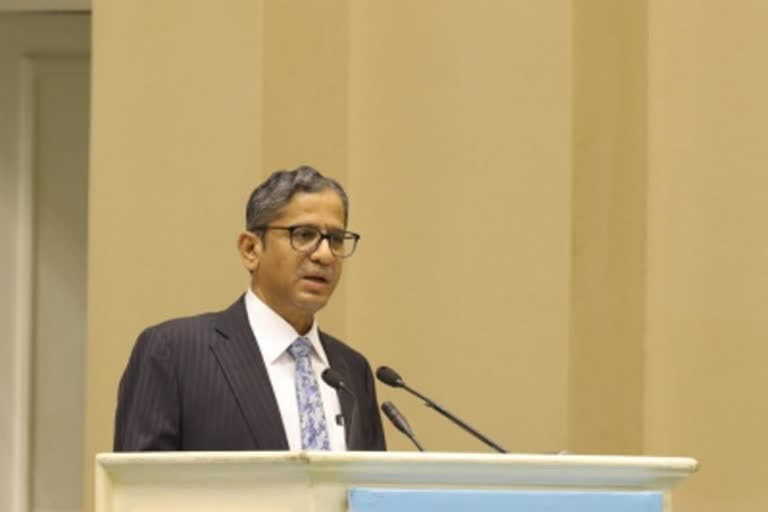New Delhi: Chief Justice of India NV Ramana Tuesday paid his tributes to the medical professionals who lost their lives in the fight against COVID-19 and expressed his gratitude to doctors for their services and said the negative instances of doctors - who continued to work on the frontline -- being threatened, attacked and abused during the pandemic was truly unfortunate.
The CJI also said that medical awareness was extremely significant for society and termed quackery as the biggest disease affecting the country. Noting that there are false cases against upright and hardworking doctors and a massive brain drain is taking place as young talent was moving abroad, the CJI said an environment where more young people want to become doctors has to be fostered and the government must ensure the welfare of its doctors and improve their working conditions.
Justice Ramana, who was speaking at the inaugural National Academy of Medical Sciences (NAMS) Public Oration on 'Law and Medicine, emphasised that healthcare infrastructure and policy cannot be planned only when an emergency arises and doctors were extremely important in framing the roadmap to healthcare in the country.
During the pandemic, I saw various instances where doctors had been threatened, abused, attacked, and shunned. Despite this, they continued working on the front lines. This negative response towards doctors is truly unfortunate. Several false cases are being lodged against upright and hardworking doctors. "They need a better, and more secure, working environment. We must foster an environment where more young people want to become doctors to serve Indian society. This attitude towards doctors is pushing out our best talents abroad, the CJI stated.
He said that many aspiring doctors from small towns and rural areas rely on the government for education, support, and employment and the government must also think of stronger incentives to make doctors accessible to the rural population. We as a society must change this and incentivize our doctors to stay in India and continue their service and help meet both our medical and social goals. The Central and State Governments too have a serious responsibility. Many aspiring doctors from small towns and rural areas rely on the government for education, support, and employment. But, beyond this initial support, the government must look out for the welfare of its doctors and improve their working conditions, he said.
In his address, the CJI spoke on the corporatisation of the healthcare system and said that while it is not necessarily a bad thing, there was a glaring need for balance as hospitals were being run like companies and profit making was becoming more important than service to society and the cost of healthcare was forcing people to suppress their needs.
Due to this, hospitals and doctors alike are desensitized towards the plight of patients. They are just numbers for them. This trend has also spread monopoly and is deepening the inequities in access to health care. I understand that there are many doctors on the boards of various private hospitals, having the responsibility to balance corporate interest with medical interest. Now, with the increasing intervention of corporate boards, the individual autonomy of doctors is getting eroded, he observed.
There is also a growing distrust as hefty fees, chaotic experiences and sub-par service has marred the relationship" between doctors and the public, and the lack of accessible healthcare was giving space to quacks, he added. Terming quackery as the biggest disease affecting the country, CJI Ramana said that the need of the hour was to bring in legislation to save people from falling prey to fraudulent practices in the name of treatment.
Quackery begins where awareness ends. Where there is room for myths, there is room for quackery. Quackery is the biggest disease affecting India. Owing to financial and time constraints, a huge majority of the Indian population approaches these untrained and uncertified doctors. Lack of awareness and knowledge, misplaced belief, and sheer inaccessibility have massive ramifications on the health of the country, particularly the rural and under-privileged India, CJI Ramana said.
Speaking on the issue of medical negligence, Justice Ramana observed that doctors ought not to be penalized in cases having the best intentions and efforts, adding, After all, doctors are humans too. He further said that as primary health givers, doctors can play transformational roles in enhancing social well-being and the need of the hour was to include medical leadership in shaping healthcare policies and strategies.
The CJI also said that medical awareness was extremely significant for our society which is filled with inherent notions and superstitions and more and more young practitioners were needed to work towards universal health coverage and reduction in disparity in healthcare. We have all learnt how a health emergency can cripple the entire nation. Health infrastructure and policy cannot be planned only when an emergency arises. It requires careful planning and involves a meticulous thought process to manage resources in an efficient and effective manner, he stated. (PTI)



